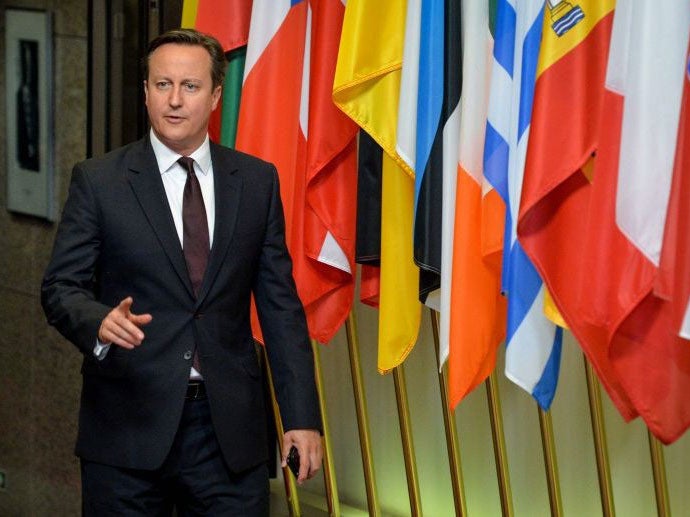Grexit could boost Cameron's efforts to win better deal for UK from EU, say diplomats
However in the short term, the Greek crisis could damage growth in the eurozone, with a knock-on effect on Britain

A Greek exit from the euro could boost David Cameron’s attempt to win a better deal for the UK from the European Union, British and EU diplomats believe.
In the short term, the Greek crisis could damage growth in the eurozone, with a knock-on effect on Britain. The turbulence could provide a “bad advert” for the EU, pro-Europeans admit.
However, officials in London and Brussels believe a Greek exit from the single currency could strengthen Mr Cameron’s hand in his negotiations on new membership terms ahead of the in/our referendum he has promised by 2017.
They believe the remaining eurozone members might speed up planned reforms in an attempt to convince the financial markets the currency is still viable. Talks on these integrationist measures were not due until 2017. Any changes to the EU’s governing treaty would require the unanimous approval of all 28 EU members, giving Mr Cameron the chance to table his demands in return for backing the eurozone reforms.
Even if a new treaty were not approved until after the UK referendum, one of the Prime Minister’s proposals would rise up the EU agenda after a “Grexit” – measures to safeguard the rights of EU members which are not in the single currency.
A Greek withdrawal from the euro could also add weight to Mr Cameron’s proposal to exempt Britain from the EU’s commitment to “ever-closer union,” diplomats believe. One senior source in Brussels said: “The landscape would change dramatically. This could turn to Britain’s advantage. It would make it easier for Cameron to argue that his reforms were good for Europe, not just a special deal for Britain.”
A Greek withdrawal from the euro – which could even be followed by Greece leaving the EU – would make other countries keener to make concessions to Mr Cameron to head off an Out vote in the UK referendum, which would be seen as a devastating second blow to the EU project. In Germany, a British departure from the EU is seen as a more serious threat than Greece leaving the euro.
Stephen Booth, co-director of the Open Europe think tank which campaigns for EU reform, said: “While the UK should take no pleasure in the tragic and unedifying spectacle playing out in Athens and Brussels, a Grexit would raise the stakes but, on balance, present an opportunity for Britain to challenge the status quo, provided the diplomacy is handled with care.”
Mr Booth added: “It is the ideology of ‘ever-closer union’ that has made life so uncomfortable for the UK in the EU and this is why Cameron is right to seek to redefine it. Just as Greece cannot sustain monetary union, the likelihood is that Britain will leave the EU if there is no alternative to further political union.
If, however, the EU redefines itself as a single market, in which non-market areas — such as currency, justice, defence and social policy — are subject to voluntary arrangements, those countries that want political union could have it, while those who do not would continue to cooperate. That this could be the solution to problems as different as Greece and Britain illustrates the benefit to Europe as a whole.”
George Osborne said Britain should “prepare for the worst” after Greece failed to honour a £1.1bn repayment to the International Monetary Fund. He said: “The failure of the Greek government to make its scheduled payments to the IMF and the expiry of Greece’s financial assistance programme, have served only to add to the developing crisis in that country. It is vital now that the current uncertainty is resolved, whatever the Greek people decide, to ensure economic and financial stability across Europe.”
The Chancellor added: “Britain’s attitude to this developing crisis is clear: we hope for the best; but we prepare for the worst, and we stand ready to do whatever is necessary to protect our economic security at this uncertain time.”
Subscribe to Independent Premium to bookmark this article
Want to bookmark your favourite articles and stories to read or reference later? Start your Independent Premium subscription today.

Join our commenting forum
Join thought-provoking conversations, follow other Independent readers and see their replies